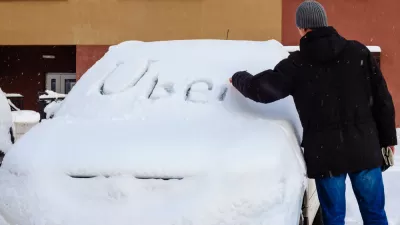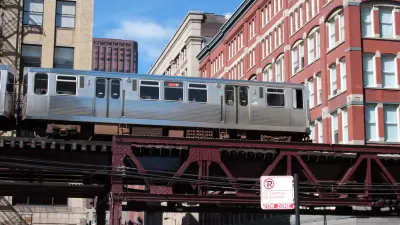Uber and other ride hailing services have put a lot of cars on the road. Could a congestion fee on users of these services help curb the impact of those cars?

Winnie Hu argues that New York City should consider a congestion fee for ride share companies. The city’s mayor, Bill de Blasio, has consistently resisted calls for congestion pricing to reduce pollution and congestion in the city, but Hu contends that the city may be able to create a more popular policy if it crafts a fee like the one recently voted into law in Chicago and took a congestion fee from ride hailing service users only.
Hu reports that the number of cars for hire has more than doubled in the city since 2013, and that many of those cars are riding New York's busiest streets without carrying passengers. To combat this new feature of the city, Hu argues riders in Ubers and other transportation network companies should pay a congestion fee.
Critics of Hu's article point out that this kind of targeted congestion pricing benefits drivers of private cars, who wouldn't pay this kind of fee; meaning that, while such a fee might take some passengers and drivers out of traffic and onto public transit, it's just as likely that it could be putting new drivers on the road, curbing neither pollution nor congestion.
FULL STORY: Your Uber Car Creates Congestion. Should You Pay a Fee to Ride?

Maui's Vacation Rental Debate Turns Ugly
Verbal attacks, misinformation campaigns and fistfights plague a high-stakes debate to convert thousands of vacation rentals into long-term housing.

Planetizen Federal Action Tracker
A weekly monitor of how Trump’s orders and actions are impacting planners and planning in America.

In Urban Planning, AI Prompting Could be the New Design Thinking
Creativity has long been key to great urban design. What if we see AI as our new creative partner?

King County Supportive Housing Program Offers Hope for Unhoused Residents
The county is taking a ‘Housing First’ approach that prioritizes getting people into housing, then offering wraparound supportive services.

Researchers Use AI to Get Clearer Picture of US Housing
Analysts are using artificial intelligence to supercharge their research by allowing them to comb through data faster. Though these AI tools can be error prone, they save time and housing researchers are optimistic about the future.

Making Shared Micromobility More Inclusive
Cities and shared mobility system operators can do more to include people with disabilities in planning and operations, per a new report.
Urban Design for Planners 1: Software Tools
This six-course series explores essential urban design concepts using open source software and equips planners with the tools they need to participate fully in the urban design process.
Planning for Universal Design
Learn the tools for implementing Universal Design in planning regulations.
planning NEXT
Appalachian Highlands Housing Partners
Mpact (founded as Rail~Volution)
City of Camden Redevelopment Agency
City of Astoria
City of Portland
City of Laramie





























